
Prahlad Maharaj
By H.H. Satsvarupa das Goswami
From the most ripened vedic wisdom, Srimad Bhagavatam describes the story of sublime devotion.

Prahlad Maharaj was a boy, five years old, preached to his school-fellows of their urgent need for taking to Krishna Consciousness. Prahlad was the son of a very powerful atheist king, Hiranyakashipu. Since his birth he was in the hands of “Daityas,” or enemies of God. The nurses who picked him up, the court attendants, his mother, the court children-all were obsessed with the illusion that the body is the self, and there was no talk of Krishna, the supreme Spirit. Like most boys born in our contemporary civilization, Prahlad’s chances for hearing any truth about the Supreme Personality of Godhead were almost nil.
Yet every day when the teacher would take a recess and leave the school room, this five old boy would address his fellows in this way: “My dear atheist friends, now it is the time to prosecute Krishna Consciousness, at this young age. Listen, my fellow demons, we have to start now! I know you want sense gratification, but we have to start Krishna Consciousness immediately. Else we’ll never get out of the material entanglement. This material life will soon become too complicated and we won’t be able to get out. We’ll be like silkworms trapped in our own cocoons!”
When Prahlad spoke, the boys would only say, “Let us play, Prahlad! We’re only children. We’re only five years old! We can do Krishna Consciousness when we get older.”
“Yes,” Prahlad would respond, “I know you want to play. But just listen a moment. There’s no need to try hard for sense happiness. That happiness will come without any endeavor, according to whatever body you have. Arrangements are already made by nature and will come on its own as misery comes. But there’s a need to develop an understanding of the dear most thing in life.
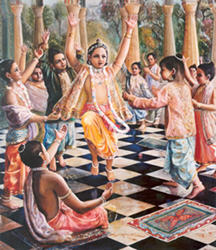
“Each of us is looking for his dear most friend. That dear most friend is the Supreme Lord, Krishna. He’s in everyone’s heart and He’ll make us satisfied forever. We can just chant His name, ‘Hare Krishna,’ and we’ll be connected with Him. He’ll dictate us how to reach Him.”
Gradually the boys began to listen. “Where did you get this excellent knowledge from?” they asked. “You’re like us, only five years old and never leave the palace grounds. It’s not possible for you to go and take some instructions outside. Our teachers never taught us this. Where did you learn it?”
The answer was that Prahlad had learnt Krishna Consciousness from the foremost sage of Vedic times, Narada Muni. He had learnt it when he was in the womb of mother. Prahlad’s mother was pregnant at the time of a great war between demigods and demons. The demigods were led by Indra and the demons were led by party of Hiranyakashipu. The victorious demigods eventually entered the cities of the demon king and ransacked his deserted buildings. King Indra himself had entered the palace of Hiranyakashipu, and was taking Prahlad’s mother, the Queen.
Narada appeared and stopped him and said “Do not take her! It is not right, for she is chaste”.
Indra answered, “I’m not doing anything wrong.She is carrying a child within her womb who is Hiranyakashipu’s son. She is therefore carrying a snake, and I just want to keep her in custody until the child is born and we can take him away. I had no other purpose.”
“No,” Narada protested. “She is carrying a great soul within her womb. Don’t try to kill him nor you could kill him, since he is a great devotee.”
Solely on the words of the pure saint Narada, Indra gave up his plan and the queen was allowed to go with the saint to his hermitage. Narada gave her shelter at his ashram. As he was a very great devotee he spoke the spiritual science of Krishna Consciousness to her daily. Prahlad, who had developed within her womb heard all these discussions, and he never forgot.
Actually, every human child attains a confrontation with God just before the time of birth. It is stated in the Srimad Bhagwatam that the process of development within the womb is extremely painful for the child, as he has to live in a cramped position, near gastric fire, stool and urine. Just at the time of birth, conditions become unbearable and he then prays to the Supreme Lord, who is seated within his heart as the Supersoul. The child promises that if the Lord will just get him out of this predicament, he will become a sincere devotee of Godhead and so will never again have to take mortal birth.
Once he is out, however, with the shock of entering into the material world the living entity loses all memory of his promise to God. From the first moment after birth, he is in the hands of nurses, friends and relatives who are themselves under the illusion that the goal of life is sense gratification. They mistake the body to be the self. So the child forgets.
But Prahlad did not forget Krishna. He told his daitya fellows how life is wasted: “Non-believers, just look! How long can you live? at most, 100 years. First 20 years are all spent in playing ball and sporting. During the middle forty years sex is very prominent, and those years are all spent in the pursuit of sex pleasure.
“Sex life begins when one meets a girl and think, ‘She’s nice.’ When there is sex, the root of attachment is made. Then one gets married and have children. One must earn to support family and for all the work one performs, one needs some recognition. So one must labor for that and at the same time serve family so that they can expand in wealth and material happiness. Under such conditions there is no chance of getting out of material, death bound existence. There is no time for finding out Vishnu, God, the dearmost thing in life.
“If we calculate the life span i.e., 20 years in sporting, 40 years in sex life and married life. Then at the end of life, the last 20 years are feeble and invalid. Or, even if a man has good health he remains enamored up to the last moment, playing with his fond grandchildren and making no preparation for spiritual life. So where is the time for Krishna? If a man spends his life in this way, always attracted to the non permanent and forgetful of his real self-interest, the eternal Vishnu within the heart, then at the time of death he will fall back among the struggling, lower species of life and have to take another body as an animal.
“O demon brothers, so we have to take action in this youthful age. Only by freeing ourselves from the material consciousness of life, we can realize who that we are not this body but the eternal spirit soul. Come, put your faith in the authority of Narada, and you can derive the same benefit as I have!”
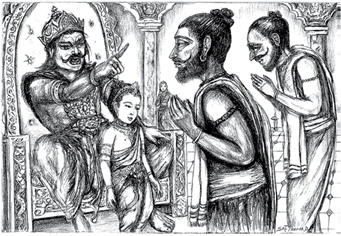
The news of Prahlad’s preaching ultimately reached Hiranyakashipu. He called his son’s teachers. “What is this Hare Krishna?” he demanded to know. “I understand all the boys are chanting some nonsense about God. What are you teaching to Prahlad?”
The Srimad Bhagwatam states that at this time Hiranyakashipu had come to dominate all the planetary systems by ruthless force. He had gained such great power by performing an excruciating austerity by standing on his toes with his arms upraised and remained in that position uninterrupted for 125 years. Hiranyakashipu frightened the demigods that they had to run to their supreme leader, Lord Brahma, the prime living entity and creator of the material universe.
“What does this man want?” they asked Lord Brahma. “Please go and grant him some boon so that he may be satisfied before he becomes very powerful and cause great disturbances!”
Lord Brahma at once approached Hiranyakashipu and asked his wish. The demon king asked to be made immortal.
“You must ask for something else,” Lord Brahma replied. “I myself am bound sometime to die.”
Thereupon Brahma conferred a boon upon HiranyaKashipu which made him invincible in all the material worlds: he would never be killed by man or beast, nor at night, nor in the daytime. He would never be killed on earth, nor on the sea, nor in the air, nor by any weapon.
With this power conferred upon him, he assumed himself unconquerable. Hiranyakashipu took up the business of dominating the entire universe for his personal pleasure. So great was his might that it is said the demigods would tremble at the mere upraising of his eyebrows.
Prahlad’s teachers, however, had committed no offense before Hiranyakashipu. “Sir,” they explained, “We do not know where your son has learned this Hare Krishna, but he is ruining our whole school! We have only taught mathematics, economics, history and the other subjects. We don’t know where he has got it from. But he’s preaching to the other children every day, whenever he can.”
HiranyaKashipu then called his son before him. The father was a materialist and he wanted his son to get a good education so that the boy would be advanced in the attainment of money and beautiful women. The very name of the demon king indicates this. “Hiranya” means soft bed, and “Kashipu” means gold. These were the basic principles of his life.
The father now made Prahlad sit on his knee and with affection asked his boy, “What is the best thing you have learned from your teachers?”
Prahlad replied honestly to his father. “O foremost of atheists,” he said openly, “I haven’t learned anything good at all from my teachers. But I do know the best thing.”
“Oh? And what is that best thing?”
“I have heard that the best thing is to leave this dark well of material life and to take shelter of Krishna, the Lord.”
This answer caused the break that could not be repaired.The father was a determined atheist, and the son is a firm devotee of Krishna.
“Tell me,” HiranyaKashipu continued. “What is this teaching that you could not learn from our Brahmins? What is this teaching of Krishna?” he demanded.
The boy replied, “My dear atheist father, if I told you you could not know, and so I cannot even bother. If you took courses in it, still you would not understand, because you are too attached to sense gratification.”
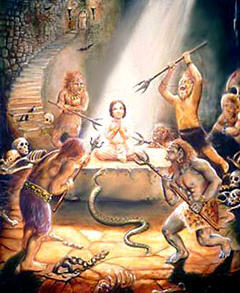
Hiranyakashipu became extremely angry and threatened his son, but Prahlad was unflinching. He simply remembered the teaching of Narada, and took shelter in thinking the form of Krishna. To every question and demand of his father, Prahlad answered in terms of love of Krishna.
The father, who was unaccustomed to the slightest hint of insubordination, finally took hold of the boy and personally dragged him outdoors to a nearby cliff. With uncontrollable fury he threw Prahlad into the abyss. However, all-pervading Krishna caught hold of his devotee and saved him from the intended destruction.
Hiranyakashipu’s anger intensified and tried to destroy the life of Prahlad by one or another means. He set a great pot of water boiling and pushed the boy into it, but Prahlad was not hurt. He tried to freeze the boy in a snowstorm and he tried to tear apart by the winds of a hurricane.But Prahlad was in direct spiritual communion with Krishna, and so he was at all times protected by the intervention of his worshipable Lord.
Hiranyakashipu, obsessed, threw his son into a pit of snakes, but they did not harm him. He placed Prahlad under the foot of an elephant, but with his trunk the elephant picked the child up and placed him on his back for a triumphant ride. The fierce king forced Prahlad’s mother to administer poison to the boy in his food, but it would not take effect. In a seething fury of frustration, Hiranyakashipu finally picked the boy up in his own hands and hurled him to the floor, as though to smash him like a rock. Prahlad, in meditation upon Krishna, the Soul of souls, remained unhurt even by this attack.
“Where do you get the supernatural powers from?” Hiranyakashipu screamed, standing over his son.
“From the same place you do,” Prahlad replied mildly. “From God.”
In great anger Hiranyakashipu said “God!? What is God? Where is your God?”
“My God is everywhere,” Prahlad said.
“Everywhere?”HiranyaKashipu drew his sword.
“Yes, everywhere.”
“Is He in this pillar?” HiranyaKashipu cried, pointing with his weapon to a nearby column of marble.
“Yes,” said Prahlad evenly.
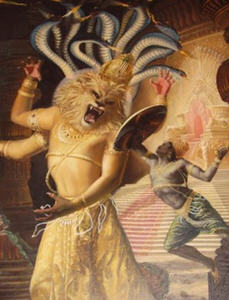
Then, the mighty demon drew back his sword and struck a single unimaginable blow at the mute column. Then, just as his sword fell upon it, the pillar burst into a thousand pieces. With a roar that deafened half the cosmos, a most wonderful being jumped from the pillar. This was Lord Nrishingha, a form of God manifesting fear personified. As God is perfect in all things, He was able to answer the dread challenge of Prahlad’s father and it caused a brief but terrible struggle.
Half-lion and half-man in appearance, Nrishingha fell upon Hiranyakashipu, who struck back with all anger. But he was nothing against the boundless might of God. Lord Nrishingha quickly caught him up with His nails and stretched the angry, incredulous demon across his lap, and then tore him apart.
Hiranyakashipu died instantly upon that blood-drenched lap. In this way, as Nrishingha was not a man, and as the time was twilight-neither night nor day and as the king was killed on the lap of the Lord, which was neither sea, air nor land. As he was torn apart by no weapons but the claws of Nrishingha. So none of Brahma’s promises to Hiranyakashipu were broken yet he was vanquished.
Prahlad, unafraid, bowed down and offered his profound obeisances before this form of the Supreme Personality of Godhead. “O my Lord,” he prayed, “I know that You have thousands of forms, and that there are as many forms of the Supreme Person as there are species of life in the world.”
In this way Prahlad worshiped the lotus feet of the fierce half-man half-lion appearance of Sri Krishna, from whom everyone emanates. As Nrishingha, He appears as the source of all ferocity, just as in the original form of Radha Krishna He is the source of all Love. To Prahlad, the long hard nails of Lord Nrishingha and His fierce aspect created no terror.
He prayed “The rays from Your lotus feet are more soothing than 10,000 autumnal moons. But I truly fear from the reaction of birth and death in this world, which is whirlpool of bad things. I do not fear Your nails, O Lord and Protector! But I fear this world of karma, where the remedies we seek for our ills are worse than the ills themselves. Only by taking shelter of You, we become fearless and satisfied.”
The Lord was very pleased and He requested that His devotee ask for his heart’s desire.
Prahlad replied, “Don’t ask me to take anything, my Lord. Worship is my duty. If I should take something in return, then I have become a merchant.”
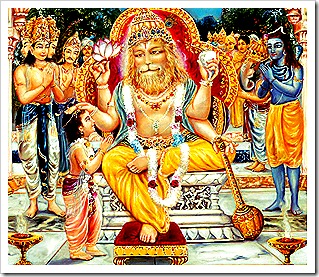
But the Lord again asked Prahlad to seek a boon. Prahlad, as a devotee, had no personal desire, now he thought of his father. So he prayed that his father might be pardoned for his offenses and grant liberation. The Lord assured the child Prahlad that not only would his father be liberated from the hellish conditions of life in the material world, but many generations of his family, both in the past and in the future, would be granted liberation. Such is the purifying influence of a pure devotee in a family.
Just to hear the narration of Prahlad’s activities is auspicious as he fixed his mind on the Lord in remembrance. Thus we can derive that full, eternal, blissful freedom from evil which the Lord promises mankind in the Bhagavad Gita as:
“Give up all varieties of religiousness, and just surrender unto Me; and in return I shall protect you from all sinful reactions. Therefore, you have nothing to fear.” (BG 18.66)